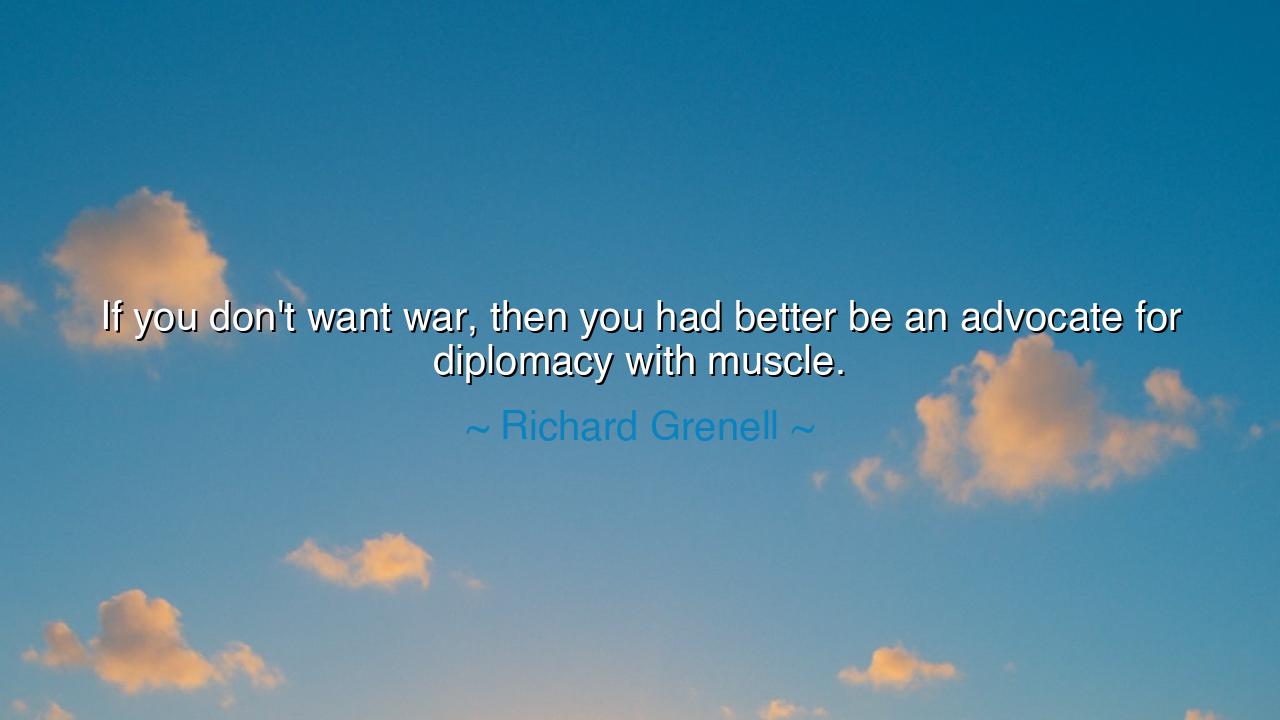
If you don't want war, then you had better be an advocate for






Listen closely, O children, to the words of Richard Grenell, a voice in the modern world that calls us to understand the delicate balance between diplomacy and the hard truths of strength: "If you don't want war, then you had better be an advocate for diplomacy with muscle." These words speak to a truth that has been known throughout history—that true peace is not achieved through weakness or passivity, but through the strength of resolve and the readiness to defend one's values when necessary. Diplomacy, that noble art of negotiation and communication, cannot stand alone. It must be supported by the steady hand of strength, the willingness to act with power when the time demands it. Without this, diplomacy risks being ignored or trampled by those who only respect might.
In ancient times, O children, the great empires knew this well. The Romans, the masters of diplomacy, understood that the strength of their legions was the foundation upon which their diplomatic efforts rested. Julius Caesar, in his quest for power, was not only a master of negotiation but also a conqueror who wielded immense strength in battle. The peace that the Romans brought to much of the ancient world, the Pax Romana, was not a peace born of goodwill alone. It was a peace enforced by the power of the Roman army. Their diplomacy was effective because it was backed by the muscle of an empire that could strike swiftly if its interests were threatened. In this way, diplomacy with muscle was the path to lasting peace, not through idle words but through a show of strength that ensured the respect of others.
In more recent history, the lessons of diplomacy with muscle were brought to light during World War II. When the forces of fascism threatened to engulf Europe, it was not through diplomacy alone that the Allies found their victory, but through a powerful combination of negotiation and overwhelming military force. The United States, under the leadership of figures such as Franklin D. Roosevelt, understood the importance of forging alliances—diplomacy—but also the necessity of having a military capable of overwhelming its enemies when words failed. The muscle of the American military and the eventual involvement of the Soviets turned the tide of war. This combination of strategic diplomacy and readiness to use force when required became a cornerstone of the Allied victory, proving that peace often requires the balance of both diplomacy and strength.
Yet, this is not merely a lesson of old wars and empires. In our own time, the principles of diplomacy with muscle are just as relevant. Consider the Cold War, a period defined by the delicate dance of diplomacy and the looming threat of nuclear war. Leaders like John F. Kennedy and Nikita Khrushchev knew that the world teetered on the edge of destruction. Kennedy, in particular, understood that negotiations were key during the Cuban Missile Crisis, but he also understood that the United States had to show it was prepared to act if the Soviet Union did not back down. The presence of military might ensured that diplomacy was not just a conversation but a force that demanded respect. The eventual peaceful resolution of the Cuban Missile Crisis was not only the result of words, but the result of a muscular diplomacy that signaled the willingness to take action if necessary.
So, what of the lesson we must learn from Grenell’s words? It is this: the path to peace is not paved with weakness or empty words, but with the strength to stand firm, to protect what is right, and to act when necessary. Diplomacy is a powerful tool, but it is a tool that requires the backing of strength to be truly effective. The weak may offer words, but those words are often ignored. It is only when diplomacy is backed by the promise of action—by the resolve to defend what is just—that it carries weight. Grenell teaches us that we must be advocates for diplomacy, but not mere talkers; we must be ready to support that diplomacy with the muscle of strength when the situation demands it.
In your own lives, children, this principle is equally important. To seek peace and understanding with others is a noble endeavor, but peace is not achieved by submission or passivity. It is achieved by standing firm for what is right and being willing to defend your values, your beliefs, and your loved ones. Whether in your personal relationships, in your communities, or in the wider world, remember that diplomacy, kindness, and negotiation are vital—but so is strength. Strength is not just about physical might, but about the strength of character, the resolve to protect what you believe in, and the ability to act when necessary.
Therefore, let these words guide you: "If you don't want war, then you had better be an advocate for diplomacy with muscle." Seek peace, but know that peace is not a passive act. It requires strength, resolve, and the courage to back up your words with action. As you walk through life, let your diplomacy be backed by the muscle of integrity, of conviction, and, when necessary, the courage to stand firm. For it is this balance of peace and power that will guide you through the challenges of life, and ensure that your voice is not just heard, but respected.






AAdministratorAdministrator
Welcome, honored guests. Please leave a comment, we will respond soon